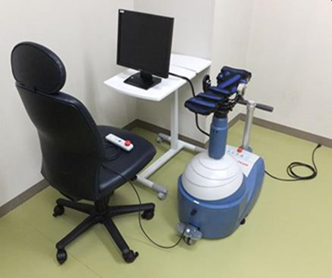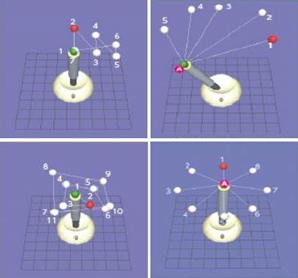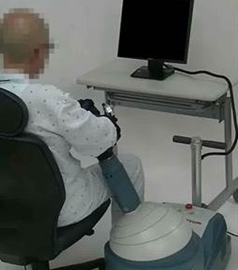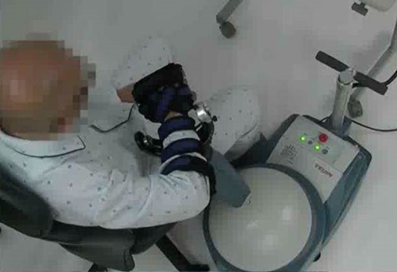Nov. 04, 2016
Teijin Pharma Launches ReoGo®-J Device in Japan for Upper-limb Stroke Survivors
Teijin Pharma Limited
Teijin Pharma Limited, the core company of the Teijin Group’s healthcare business, announced today that its new ReoGo®-J, a portable robotic arm that supports the rehabilitation of paralyzed upper limbs due to stroke, will be begin selling in Japan on November 7.
ReoGo®-J is noted for its ability to facilitate three-dimensional movements of limbs and measure their repetitive motion.
Teijin Pharma will sell or lease ReoGo®-J to university hospitals and rehabilitation facilities. Cumulative sales are expected to reach 300 units in three years and 3,000 units in 10 years. ReoGo®-J also will be developed for home care use.
To support sales, Teijin Pharma will leverage the nationwide network it has develop to sell the WalkAide®, an electrical-stimulation device for the rehabilitation of feet impaired by stroke.
Teijin Pharma is accelerating its business in the physical rehabilitation market, including for stroke and other forms of rehabilitation by expanding its device lineups and developing new home rehabilitation services.
ReoGo®-J is a rehabilitation robot designed especially for Japanese patients. It originally was developed by an Israeli venture firm as ReoGo®. The system helps to prevent the adhesion and contracture of paralyzed upper limbs and to recover range of motion in joints. A robotic arm attached to the patient’s limb helps the limb to move along a path to target point displayed on a monitor.
ReoGo®-J combines 17 various movements, such as radial and circular patterns. Five operating modes offering different load and speed levels can be selected based on the patient’s stage of rehabilitation. The system facilitates three-dimensional movements and patient-specific rehabilitation, similar to work performed by a therapist.
According to recent research, voluntary movement of impaired limbs by the patient can stimulate the recovery of brain systems and upper limb motor functions. The advantage of ReoGo®-J is that it requires patients to make various voluntary movements for initiating robotic arm motion in its operating modes, thereby creating the expected stimulation effect.
In a clinical study, patients who used ReoGo® achieved as much as 2.5 times greater improvement in upper limb motor functions compared to patients who followed other therapies. (Dr. Takahashi K, et al: Stroke 2016; 47 [5]: 1385-1388). ReoGo® also helped to alleviate therapists’ physical burdens.
 ReoGo®-J
ReoGo®-J
 Monitored arm movement
Monitored arm movement
 Image of ReoGo®-J use
Image of ReoGo®-J use
 Image of ReoGo®-J use
Image of ReoGo®-J use
Teijin Pharma, as one of its business-growth strategies, is developing advanced medical devices to support rehabilitation of impaired limbs. The company has been selling its WalkAide® electrical-stimulation device since April 2013.
Current Situation of Cerebrovascular Diseases in Japan
According to the Ministry of Health, Labour and Welfare, Japan has about 1.2 million cerebrovascular disease survivors and some 300,000 new patients each year. More than half will experience some form of damage in the central nervous system of their upper or lower limbs. Such damage may also be caused by spinal cord injury due to traffic accidents, traumatic brain injury, etc. Such physical impediments account for a significant amount of nursing care delivered each year.
Researches on Impaired Limb Rehabilitation
Conventionally, it had been thought that movement in upper and lower limbs was lost when the corresponding part of the brain is damaged. According to recent brain research, however, motor functions can be gradually recovered via neural circuits that newly form around the damaged area of the brain by rehabilitating the impaired limbs and stimulating the brain. Such evidence has focused attention on the importance of limb rehabilitation in hospitals.
About the Teijin Group
Teijin (TSE: 3401) is a technology-driven global group offering advanced solutions in the areas of sustainable transportation, information and electronics, safety and protection, environment and energy, and healthcare. Its main fields of operation are high-performance fibers such as aramid, carbon fibers & composites, healthcare, films, resin & plastic processing, polyester fibers, products converting and IT. The group has some 150 companies and around 16,000 employees spread out over 20 countries worldwide. It posted consolidated sales of JPY790.7 billion (USD 7.4 billion) and total assets of JPY 823.4 billion (USD 7.7 billion) in the fiscal year ending March 31, 2016. Please visit www.teijin.com.
Press Contact
Corporate Communications
Teijin Limited
+81 3 3506 4055
pr@teijin.co.jp



